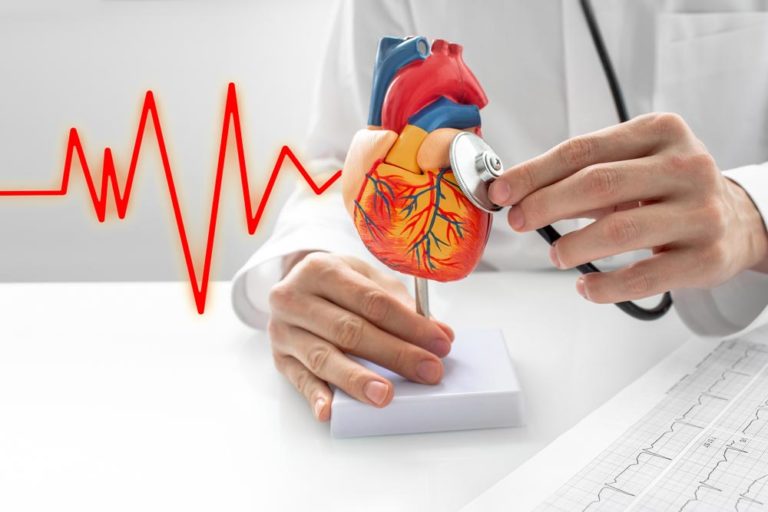Cardiovascular System
Medical Studies on Pregnenolone – Cardiovascular System

As a precursor hormone of DHEA (dehydroepiandrosterone) pregnenolone exerts important indirect effects on cardiovascular health. It improves blood flow within the blood vessels and also positively influences their degree of calcification; important factors in vascular heart disease.
Supporting Cellular Mechanisms
The protective effect of DHEA is due, among other things, to the activation of endothelial nitric oxide, which is involved as a messenger substance in vascular processes such as the regulation of blood pressure and the dilation of blood vessels. Studies have even shown that maintaining healthy physiological levels of pregnenolone, and thus also DHEA, can reduce the risk of vascular heart disease by half.
Steroid Hormones Support Heart Health
Furthermore, studies have shown that steroid hormones such as aldosterone also support cardiovascular health by maintaining healthy blood pressure and adequate water and salt balance. However, care should be taken to avoid overproduction, which can lead to hypertension. Cortisol also plays a role in blood pressure and also affects water and electrolyte balance.
Medical Studies on Pregnenolone – Cardiovascular System
Zusammenhang zwischen Dehydroepiandrosteron-Sulfat-Spiegeln und Atherosklerose bei Patienten mit subklinischer Hypothyreose
2021-03 Gonulalan G, Tanrıkulu Y
Subklinische Hypothyreose ist mit einem erhöhten Risiko für kardiovaskuläre Erkrankungen verbunden. Die verminderten Spiegel von Dehydroepiandrosteron-Sulfat (DHEA-S) werden mit Hyperlipidämie, Atherosklerose und Adipositas in Verbindung gebracht. Die niedrigeren DHEA-S-Spiegel könnten ein wichtiger Faktor bei der Entwicklung von Atherosklerose bei subklinischer Hypothyreose sein.
Plasma-Dehydroepiandrosteron-Sulfat und kardiovaskuläres Erkrankungsrisiko bei älteren Männern und Frauen
2020-12 Jia X, Sun C, Tang O, Gorlov I, Nambi V, Virani SS, Villareal DT, Taffet GE, Yu B, Bressler J, Boerwinkle E, Windham BG, de Lemos JA, Matsushita K, Selvin E, Michos ED, Hoogeveen RC, Ballantyne CM
Niedrigere Dehydroepiandrosteron-Sulfat (DHEA-S)-Spiegel wurden inkonsistent mit koronarer Herzkrankheit (KHK) und Mortalität in Verbindung gebracht. Für die Herzinsuffizienz (HF) und die Verbindung zwischen DHEA-S-Veränderung und Ereignissen sind die Daten begrenzt.
Geschlechtshormone und inzidente Herzinsuffizienz bei Männern und postmenopausalen Frauen: The Atherosclerosis Risk in Communities Study
2020-10 Zhao D, Guallar E, Ballantyne CM, Post WS, Ouyang P, Vaidya D, Jia X, Ying W, Subramanya V, Ndumele CE, Hoogeveen RC, Michos ED
Es gibt geschlechtsspezifische Unterschiede bei den Phänotypen der Herzinsuffizienz (HF), aber es gibt nur wenige Untersuchungen zur Rolle der Geschlechtshormone bei der HF und ihren Unterformen.
Dehydroepiandrosteron im Stoffwechsel und im kardiovaskulären System in der postmenopausalen Phase
2020-01 Teixeira CJ, , Veras K, , de Oliveira Carvalho CR
Dehydroepiandrosteron (DHEA), das meist als sein sulfatierter Ester (DHEA-S) vorliegt, ist ein anaboles Hormon, das mit dem Alter natürlich abnimmt. Außerdem ist es die am häufigsten vorkommende Androgen- und Östrogenvorstufe im Menschen.
Geschlechtsdimorphismus nach einer in vitro Ischämie in der Reaktion auf Neurosteroide und Mechanismen der Schädigung
2020-01 Altaee R, Gibson C
Der zerebrale ischämische Schlaganfall ist eine bedeutende Ursache für Morbidität und Mortalität. Nach einem Schlaganfall bestehen Geschlechtsunterschiede in Bezug auf Inzidenz, Symptome, Ergebnisse und Ansprechen auf bestimmte Behandlungen. Die molekularen Mechanismen der Schädigung, die nach einer Ischämie aktiviert werden, könnten sich zwischen den Geschlechtern unterscheiden und, falls dies der Fall ist, zumindest teilweise für die geschlechtsspezifischen Unterschiede im Ansprechen auf die Behandlung verantwortlich sein.